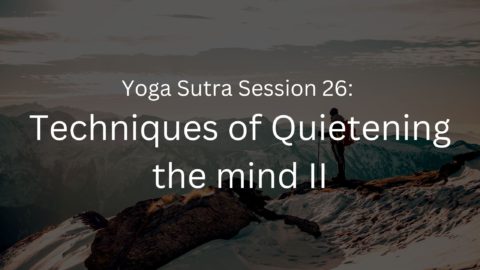THE SAME OBJECT IS SEEN IN DIFFERENT WAYS BY DIFFERENT MINDS. AN OBJECT IS NOT DEPENDENT ON ONE MIND.
But still, Patanjali is not saying the same things as Bishop Berkeley. Berkeley says that things are absolutely dependent on the mind. He says that when you go out of your room everything in the room disappears. If there is nobody to see, how can things exist? And, in a way, it is difficult to disprove him because he says, “When you come back into the room again, things appear. When you go out, they disappear because a mind is needed to interpret them.” Berkeley is saying that things are nothing but interpretations. So when you go out, of course your interpretation goes with you and there is no thing left in the room. It is very difficult to prove that he is wrong, because if you come back into the room to prove, you have come back, so things have appeared. But people have tried.
One man tried to find a few things which even Bishop Berkeley would be forced to believe.
You are sitting in a train and the train is moving, and you are not looking at the wheels, but still they are, because the train is moving. Nobody may be looking at the wheels, but you cannot deny that they are, otherwise you would not reach from one station to another. And all the passengers are inside the train but nobody is looking at the wheels, but wheels are. Of course, he was also worried about things because if all things disappear, then how will they come back again? Finally he decided that they exist in the mind of God, so even when you are not there God is looking at your furniture.
That’s why it remains; otherwise it would disappear.
Berkeley’s philosophy is very logical in a way. He believes in the mind, and he does not believe in matter. He says matter exists just as things exist in your dreams. In your dream you see a palace; it exists there, as real as anything you have ever seen. By the morning, when you open your eyes, it is gone. But when you dream it again it is again there. He’s a perfect mayawadin, a perfect believer in illusion, that the world is illusory.
But Patanjali is very scientific. He says that the thing is not your interpretation, though whatsoever you think about the thing is your interpretation. The thing in itself exists. When nobody comes into the garden – the carpenter, the woodcutter, the painter, the poet, the philosopher; nobody comes into the garden – still flowers flower, but without any interpretation. Nobody says they are beautiful, so they are not beautiful, they are not ugly. Nobody says they are white or red, so they are not red or white, but still they are.
Things exist in themselves, but we can know things in themselves only when we have dropped our minds. Otherwise, our minds go on playing tricks. We go on seeing things which we desire. We see only that, which we want to see. Osho said that in his ashram – It happens every day: I talk to you; you listen to that, which you want to listen to. You choose that which helps you. Your own mind is strengthened by it. If I say something which goes against you, there is every possibility you will not listen to it. Or, even if you listen to it, you will interpret it in such a way that it does not create any irritation in your mind, that it is absorbed, that you make it a part of your mind. Whatsoever you hear has to be your interpretation, because you listen from the mind.
Patanjali says: right listening means listening without the mind, right seeing means seeing without the mind; you are simply aware.
AN OBJECT IS KNOWN OR UNKNOWN DEPENDING ON WHETHER THE MIND IS COLORED BY IT OR NOT.
Now, one more thing: when you look at an object, your mind colors the object and the object colors your mind. That’s how things are known or unknown. When you look at a flower you say, “Beautiful.”
You have projected something on the flower. The flower is also projecting itself onto your mind: its color, its form. Your mind gets in tune with the form and the color of the flower; your mind gets colored by the flower. That’s the only way to know a thing. If you are not colored by the flower, the flower may be there but you have not known it.
Have you watched it? – You are in the market-place and somebody says, “Your house is on fire!” You start running, you pass by many people. Somebody says, “Hello, where are you going?” but you don’t listen. On another day, at another time, you would have listened, but now your house is on fire.
Your mind is totally directed towards your house. Now your attention is not here. You are not getting colored. You may pass a beautiful flower, but you will not say ‘beautiful’, you will not even recognize that the flower is there – impossible.
I have heard of one man, a very great philosopher; his name was Ishwar Chandra Vidyasagar. The Governor General was going to give him an award for his services, his learning, his scholarship, but he was a very poor man. He lived in Calcutta, a poor Bengali, and his clothes were not such that he should go wearing those clothes when the award was to be given to him. So the friends came and they said, “Don’t be worried, we have ordered beautiful clothes for you.” But he said, “I have never used anything more costly than these clothes. Just to get an award, should I change my whole way of life?” But the friends convinced him and he became ready. The same evening he was coming home from the market, just walking behind a Mohammedan who was walking with great dignity – very slow, with grace – a very beautiful man. And then a servant came running to that Mohammedan and said, “Sir, your house is on fire,” but the Mohammedan continued the same way. The servant said, “Have you heard me or not? Your house is on fire! Everything is burning!” The Mohammedan said, “I have heard you, but just because the house is on fire I cannot change my way of walking. And even if I run, I cannot save the house, so what is the point?”
Ishwar Chandra listened to this dialogue between the servant and the master. He could not believe his eyes, he could not believe his ears: “What is this man saying?” And then he remembered: “I am just changing my clothes and going in borrowed clothes just to receive an award?” He dropped the idea. The next day he appeared in his ordinary poor clothes. The Governor General asked, the friends asked; he related the story.
Now, this Mohammedan had a certain awareness, a certain awareness which cannot be clouded by anything, a certain wakefulness which is not easily disturbed. Ordinarily, everything colors you and you color everything. When this coloring stops, this reciprocal coloring stops, things start appearing in their true being. Then you come to see reality as it is. Then you come to know, ‘This is It’. Then you come to know that which is.
These sutras are just indicators that unless a state of no-mind is achieved, ignorance cannot be destroyed. Awareness is against ignorance, knowledge is not against ignorance. So don’t become parrots, and don’t rely only on memorizing. Don’t cram; try to see. Become more capable of seeing things as they are. The Vedas, the Upanishads, The Koran, the Bible, cannot help much. You can become great learned scholars, but you will remain, deep down, just fools. And when ignorance is decorated by knowledge then one clings to it. One does not want to destroy it. In fact, ego feels very happy.
You will have to choose. If you choose the ego, you will remain ignorant. If you want awareness, you will have to become aware of the tricks the ego goes on playing with you.
This morning, contemplate what you know and what you don’t know, and don’t be easily satisfied.
Go as deep as possible into what you know and what you don’t know. If you can decide that this you know and this you don’t know, you have taken a great step. And that step is the most significant step a man can ever take because then the pilgrimage starts, the pilgrimage towards reality. If you go on believing that you know many things, and you don’t know them, you are deceiving yourself and you will remain hypnotized by your knowledge. You will waste your whole life in drunkenness.
Ordinarily, people live just like they are deeply asleep, walking in their sleep, doing things in their sleep, somnambulists.
Gurdjieff took Ouspensky and his thirty disciples to a very faraway place, and he told his thirty disciples to be absolutely silent for three months. He told them to be so silent that they should not communicate even through eyes or gestures. And thirty persons were to remain in a small bungalow as if there were not thirty people, but as if each one was living alone. After a few days a few people left, because it was too much, impossible. And Gurdjieff was a hard task-master. If he saw somebody smiling at somebody else, immediately he was expelled because he had communicated; the silence was broken. He said, “Live in this house as if you are alone. There are twenty-nine other people, but you are not concerned with them – just as if they are not.” By the time the three months ended only three persons were left; twenty-seven had left. Ouspensky was one of those three persons. Those three persons became so silent that Gurdjieff took them outside the bungalow into the town, moved them in the market-place, and Ouspensky writes in his diary, “For the first time I could see that the whole of humanity is walking in sleep. People are talking in their sleep. Shopkeepers are selling things, customers are purchasing things, great crowds are going here and there, and I could see that moment that everybody is fast asleep; nobody is aware.” He said, “We felt so uncomfortable in that mad place that we asked Gurdjieff to take us back to the bungalow. But he said, ‘That bungalow was just an experiment to show you the reality of humanity, and you also have lived the same way. Because now you are silent you can see that people are just drunk, unconscious; not living really, just moving not knowing why, not knowing for what.’”
Watch yourself, meditate over it, and see whether you are living in sleep. If you are living in sleep, then come out of it.
Meditation is nothing but an effort to gather together the small consciousness that you have, to gather together, to crystallize it, to make all sorts of efforts to increase it more and more, and to decrease unconsciousness. By and by, consciousness becomes higher and higher: less and less dreamy; less and less thoughts come to you, and there are more and more gaps of silence. Through those gaps, windows will open to the divine. One day, when you have become really capable and you can say that, “I can exist for a few minutes without any thought or dream interfering with me,” for the first time you will know. The purpose is fulfilled.
From deep sleep you have come to deep awareness. When deep sleep and deep awareness meet, the circle is complete.
That’s what samadhi is. Patanjali calls it kaivalya – pure consciousness, alone; so pure, so alone that nothing else exists. Only in this aloneness does one become blissful. Only in this aloneness, one comes to know what truth is. Truth is your being. It is there but you are asleep. Awake.
Tags: Patanjali Yoga Sutra 48 You Are Simply Aware










